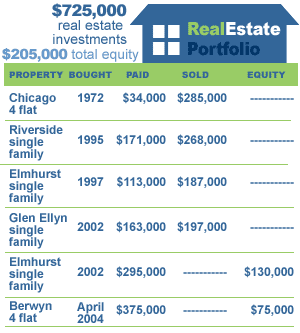NEW YORK (CNN/Money) - When Stan Tafilaw was growing up on Chicago's North Side, his father dabbled in real estate. But it was Stan's commanding officer in the U.S. Navy who gave him two pieces of advice that he quickly heeded.
 |
|
| Stan Tafilaw |
"He told me, 'Get an education and buy real estate,'" says Tafilaw, a Vietnam veteran.
After his tour, most of his efforts went into building a career as a psychiatric nurse. He worked mainly in veteran's hospitals with patients suffering from post-traumatic stress disorder (PTSD). It's a job he still finds rewarding 30 years later.
At 21, newly married and about to start a family, Tafilaw bought a single-family home. A few years later, he added a 3-unit fixer-upper in Chicago. After a divorce in the mid-1990s, his wife got the house, and he kept the apartment building.
It was then that he decided to get more serious about investing in general, and real estate in particular.
Getting back in at the right time
Tafilaw sold the three-unit in 1995, for $285,000 (he had paid $34,000). With part of the proceeds he bought a single family home in Riverside, on the western border of Chicago.
He paid $171,000 at Christmas in 1995, getting a bargain because the seller wanted to unload the house before the year's end. Two years later, Tafilaw resold for $268,000, then used part of the proceeds to buy a two-bedroom bungalow ("a small disaster") in the western suburb of Elmhurst.
"It had all the right things wrong with it," he says, explaining that the home's poor cosmetic condition lowered its price. Bringing it back to speed merely involved cleaning, painting, and picking up tons of garbage from the yard. He paid $113,000 for the house and sold it in early 2000 for $187,000.
Tafilaw's next move was a misstep. He moved into a rental apartment, and bought into the booming stock market -- just in time for the tech bubble to burst, leaving his wallet lighter by a hundred grand.
Back to basics
By 2002, the urge to buy more real estate returned. A church friend tipped him off to a house in Glen Ellyn, Ill., owned by a laid-off tech engineer who needed funds quickly.
Tafilaw bought the house for $163,000 and spent about $3,000 fixing it up, intending to live there. Instead two young passersby spotted the house and made him an offer he didn't refuse. Two weeks after the initial purchase he pocketed nearly $23,000 after accounting for taxes and expenses.
He was staying with his fiancé (they plan a June 2005 wedding) when he bought the house in Elmhurst where he now lives, paying $295,000. He believes its value has appreciated to more than $350,000.
Tafilaw's success seems predicated on two things: perseverance and price.
"Every evening when the weather is bad, I'm looking at properties," says Tafilaw. He concentrates on the slightly distressed or properties that have owners primed for a quick sale.
Minor flaws don't bother him. He hires a regular crew from the veteran's hospital for fix ups. A four-flat he bought last March for $375,000 was a "great deal" he says, because the sisters who owned it did not want to be landlords.
He bought the place vacant, spent little to upgrade (it already had a lot of new fixtures in the kitchens and baths), and focused most of his attention during the subsequent six weeks acquiring new tenants.
Life as a landlord
Landlord duties require Tafilaw's attention nearly every day and he's on site two or three times a week. Still, he finds it pretty painless to deal with tenants.

"I combine my nursing skills with my role as a landlord," he says. "I take their blood pressure when I collect rents, look at varicose veins, give the kids checkups. The tenants love it."
He rents out two of the apartments for $850 each, one for $800, and the last, a studio, for $525. After expenses, he makes about $800 a month profit.
"I will not buy a building if it can't produce positive cash flow," he says. "A lot of people in this area are buying just for the appreciation. I won't do that."
He always puts at least 20 percent down to avoid paying a mortgage insurance premium. Cash flow, then, is a tangible return on that 20 percent down investment.
He expects to close a new deal soon, a six-unit that he expects will cost $625,000. He's buying it from former Bears quarterback Bob Avellini.
A man of diverse means
Tafilaw makes about $110,000 a year nursing and as an shift administrator at another hospital every other weekend.
He sent three daughters through college and one through law school. His eldest works as a computer analyst and his youngest investigates white-collar crime for an insurance company.
Tafilaw is careful to keep his assets diversified. He has an IRA worth $310,000, a 401(k) with $210,000 in it, mutual fund accounts ($58,000), and more than $100,000 in annuities. He has three retirement 403(b)s ($75,000), a Roth IRA ($5,000), and more than $41,000 in savings.
He also owns two shares of stock: Berkshire Hathaway A shares worth about $174,000. "Warren Buffett is my personal hero," he says.

|